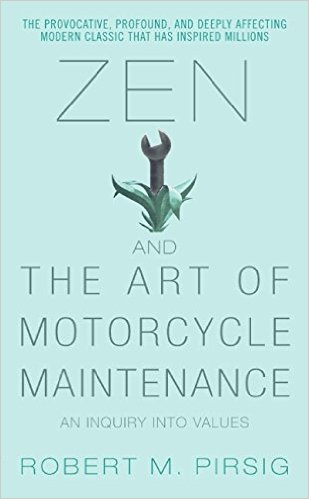I recently finished reading Zen and the Art of Motorcycle Maintenance (my "summer" read) and felt a surge of inspiration to reflect and write down some of my thoughts before I drift to sleep.

Without ruining the narrative too much, the non-fiction story revolves around the author, his son, and two friends traveling via motorcycle across the United States in an effort to basically "figure things out". The author (given an IQ of 170 at age 9) talks about two perspectives, "Romantic" and "Classical". Motorcycle maintenance is classical, but motorcycle riding is romantic. To quote...
"A classical understanding sees the world primarily as underlying form itself. A romantic understanding sees it primarily in terms of immediate appearance.”
Growing up, I enjoyed building small dams/rock "bridges" in the nearby stream near the house. Rocks fascinated me. So many different shapes, colors, and types! The next day, my creation would likely be gone, deconstructed by nature, but I didn't mind. Whenever it was too dark or cold go outside, I was often found on the computer. It could do so many powerful things! And, everything would stay the same the next day, written meticulously in ones and zeros on a disk platter.
A few years later, due to major life changes and trust issues with entities I thought were "right" my entire life, I revolted. How dare things change! How dare the people society taught me to trust betray me! In retaliation, I was extremely attracted to absolution/rationality. I drowned and nearly killed romanticism entirely, eliminating or running away from anything that was too "rocky". If I didn't understand it, I didn't want to be near it. I immersed myself in the underlying functions, this rational realm of technology and details. The only remnant of romanticism that stayed with me was music, and as as a follower, not a creator.
I used to tell people that the reason I went into Computer Science was for this "absolution" (or "classical" perspective), that it was either true or false, one or zero, if or else. It still remains the initial reason (you can't change the past), but now, I don't believe Computer Science is so absolute anymore. We have a variety of frameworks that accomplish the same objective. We iterate through various "designs and user experiences" at an absurd rate, ever changing. Test driven development, waterfall, agile, all methodologies focused upon getting to the same destination!
“For every fact there is an infinity of hypotheses.”
So, in "Zen", the author's message seemed to be: "Utilize both the romantic and classical together. Find a middle ground." I'm not there yet, but I'm going to try. A little less anxiety/watering down of a topic I'm afraid someone might find weird/not relatable. Decreased turmoil on whether or not I'm using the exact/correct HTTP status response code for an API. And no more concern over whether or not I'm living my life the "right" or "good" way.
"Zen" came out in 1974, over 40 years ago at this point. Many technological advances have come and gone, yet the power of this book's message is still strong.